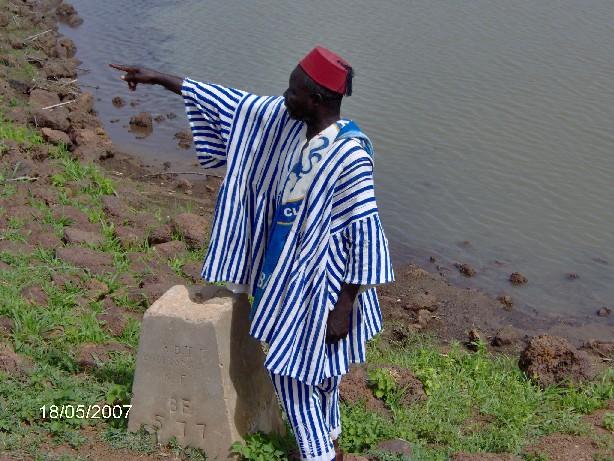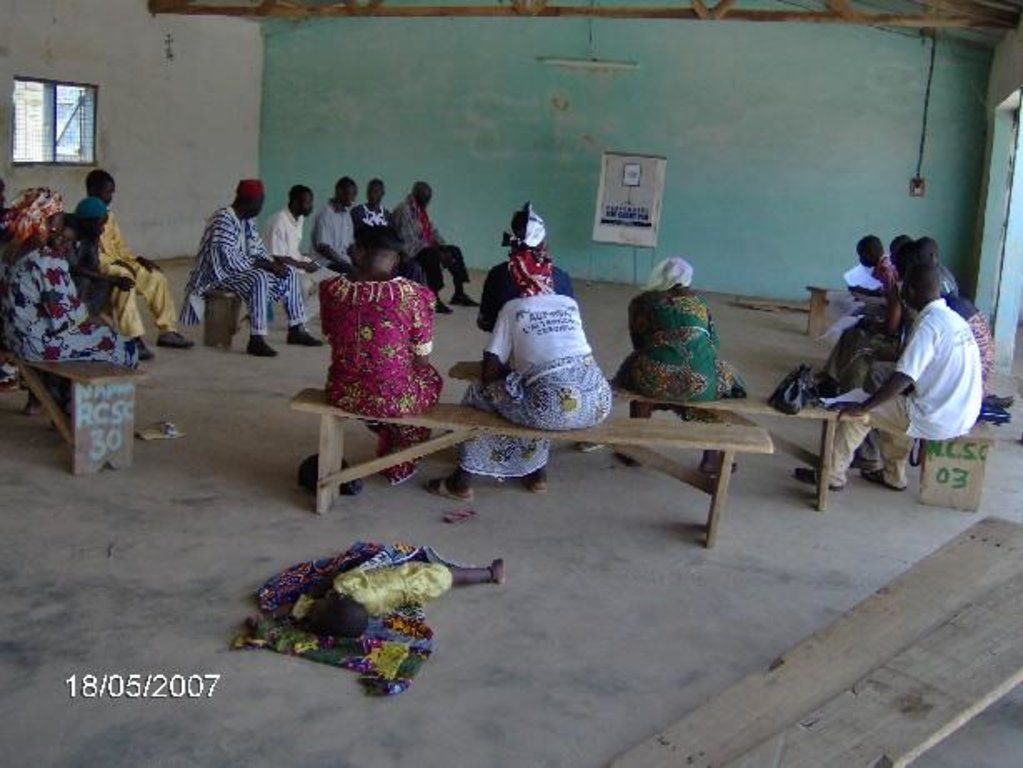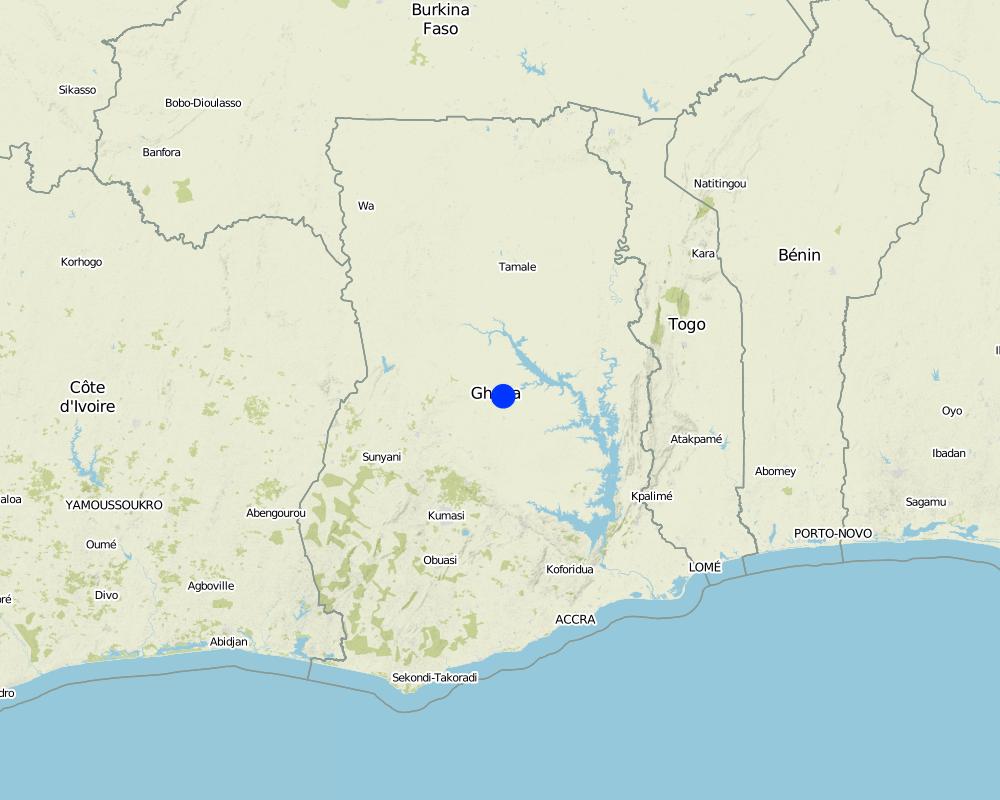Participatory Negotiated Territorial Development [Гана]
- Создание:
- Обновить:
- Составитель: Philippe Zahner
- Редактор: –
- Рецензент: Fabian Ottiger
approaches_2570 - Гана
Просмотреть разделы
Развернуть все Свернуть все1. Общая информация
1.2 Контактные данные специалистов и организаций, участвующих в описании и оценке Подхода
Специалист по УЗП:
Groppo Paolo
paolo.groppo@fao.org
FAO
Rome
Италия
Специалист по УЗП:
Cenerini Carolina
carolina.cenerini@fao.org
FAO
Rome
Италия
Название организации (-ий), содействовавших документированию/оценке Подхода (если применимо)
Swiss Agency for Development and Cooperation (DEZA / COSUDE / DDC / SDC) - ШвейцарияНазвание организации (-ий), содействовавших документированию/оценке Подхода (если применимо)
Food and Agriculture Organization of the United Nations (FAO) - Италия1.3 Условия, регламентирующие использование собранных ВОКАТ данных
Составитель и ответственный/-ые специалист(-ы) согласны с условиями, регламентирующими использование собранных ВОКАТ данных:
Да
2. Описание Подхода УЗП
2.1 Краткое описание Подхода
Participatory Negotiated Territorial Development (PNTD) is a rural development approach developed by FAO.
2.2 Подробное описание Подхода
Подробное описание Подхода:
Aims / objectives: It offers a structure to build consensus among individual communities and development partners on natural resources/territorial management and development issues. PNTD facilitates consensus based planning within a team that represents different actors at different levels, including sector offices / technical services (agriculture, environment, etc.) and NGOs (involved in community-based rural development) at district/ department/ municipality level; and traditional authorities, user groups and associations at community/ village level.
Methods: During the diagnostic phase of the PNTD process, local territorial issues are analysed based on the viewpoints of the different actors and on a historical analysis. This step contributes to a coherent, shared understanding of the territorial system, thus providing the basis for collective agreements on development. These are referred to as Social Territorial Agreements. They are based on negotiation within the PNTD team. Main activities of PNTD include: (1) Facilitation of the planning process; (2) Provision of technical expertise; (3) Linkages to relevant institutions; (4) Technical advisory to assess viability and costs of joint development proposals; (5) Reporting back to communities and provision with final plans and resource maps; (6) Signing of ‘Social Territorial Agreements’ and endorsement by local government; (7) Establishment of a joint monitoring and evaluation system; and (8) Follow-up meetings between government institutions and NGOs.
Other important information: Independent external support by territorial facilitators is essential to assist in various aspects of the process. A PNTD approach was piloted within a project in the Onchocerciasis (riverblindess) Freed Zone along the Burkina Faso-Ghana border. This newly opened zone lacked a well defined, accepted management structure to support the development process, while cross-border aspects further complicated development, requiring cooperation among the communities and development partners from both countries. The PNTD team was supported by facilitators from the Netherlands Development Organisation (SNV). The team’s capacity to carry out inclusive planning processes has improved significantly, in terms of proposal development, negotiation and consensus building, and in placing the findings of the diagnostic phase in the larger geographical context. Joint development plans were elaborated and agreed upon from the perspective of the communities. FAO has been supporting the exercise through technical backstopping.
2.3 Фотографии, иллюстрирующие Подход
2.5 Страна/ регион/ место, где применялся Подход
Страна:
Гана
Административная единица (Район/Область):
Ghana and Burkina Faso
Map
×2.7 Тип Подхода
- в рамках проекта/ программы
2.8 Каковы цели/ задачи Подхода
The Approach focused mainly on SLM with other activities (a road to link two communities directly)
Testing a PNTD approach for local (transboundary) territorial planning; Refining the methodological process; Preparing a joint development plan for the two areas in Ghana and Burkina Faso
The SLM Approach addressed the following problems: Limited commitment from central governments; Cross-border planning proved to be considerably more expensive than regular planning activities
3. Участие и распределение ролей заинтересованных сторон
3.1 Заинтересованные стороны, участвующие в реализации Подхода и их роли
- местные землепользователи/ местные сообщества
Community leaders
- общественные организации
SNV
- государственные власти (отвечающие за планирование или принятие решений)
- международные организации
3.2 Участие местных землепользователей/ местных сообществ на разных стадиях реализации Подхода
| Участие местных землепользователей/ местных сообществ | Перечислите участников и опишите их вовлеченность | |
|---|---|---|
| инициирование/ мотивация | нет | |
| планирование | нет | |
| выполнение | нет | |
| мониторинг/ оценка | нет | |
| Research | нет |
4. Техническая поддержка, повышение компетенций и управление знаниями
4.1 Повышение компетенций/ обучение
Проводилось ли обучение землепользователей/ других заинтересованных лиц?
Да
Укажите, кто проходил обучение:
- землепользователи
- местный персонал/консультанты
Тип обучения:
- в ходе работы
Рассматриваемые темы:
Training focused on: (1) the PNTD process and its application in the context of cross-border natural resource management; (2) PRA tools relevant to the diagnostic phase; (3) participatory resource mapping (a tool to support the negotiation on development proposals)
4.2 Консультационные услуги
Есть ли у землепользователей возможность получать консультации?
Да
Описание/ комментарий:
This approach focuses on establishing and maintaining social dialogue within the territory and restructuring and/or strengthening territorial institutions.
5. Финансирование и внешняя материальная поддержка
5.2 Финансирование и внешняя материальная поддержка, предоставляемая землепользователям
Предоставлялась ли землепользователям финансовая/ материальная поддержка для применения Технологии /Технологий?
Нет
5.3 Субсидии на отдельные затраты (включая оплату труда)
- нет
Если труд землепользователя был существенным вкладом, укажите, был ли этот вклад:
- добровольный
Комментарии:
No subsidies were given. Labour was not rewarded and inputs were not financed by the project.
5.4 Кредитование
Предоставлялись ли в рамках Подхода кредиты на мероприятия УЗП?
Нет
6. Анализ влияния и заключительные положения
6.1 Влияние Подхода
Сумел ли Подход помочь землепользователям внедрить и поддерживать технологии УЗП?
- Нет
- Да, немного
- Да, умеренно
- Да, существенно
improved soil conservation and livestock rearing
Did other land users / projects adopt the Approach?
- Нет
- Да, немного
- Да, умеренно
- Да, существенно
Invoked a high level of interest within the targeted communities; increased active participation, planning and consensus building capacity at community level
6.2 Основные причины, побуждающие землепользователей внедрять УЗП
- престиж, общественное давление/ солидарность
avoiding potential transboundary conflicts
- экологическая сознательность
improving natural resources and land management
6.3 Долгосрочная устойчивость мероприятий в рамках Подхода
Могут ли землепользователи самостоятельно (без внешней поддержки) продолжать применение того, что было реализовано в рамках Подхода?
- да
Если да, опишите как:
The PNTD-approach has shown applicability. Yet, there are some aspects which need to be considered: (Local) governments need to take ownership of the cross-border planning and development processes. This could be realized by structuring external support differently: (1) Local government (districts, municipalities) supported by NGO’s are responsible to carry out all activities; (2) External (project) support focuses on overall coordination, the provision of technical advice, the provision of op
6.4 Сильные стороны/ преимущества Подхода
| Сильные стороны/ преимущества/ возможности по мнению составителя или других ключевых специалистов |
|---|
| Provides a suitable framework for cross-border planning in the West African context |
| PNTD process raised the level of participation of local government institutions and NGO’s in a negotiated territorial development process through the PNTD team which comprised technical staff of these organizations. |
| PNTD enabled (and stimulated) the communities on both sides of the border to interact and joint development plans were elaborated and agreed upon from the perspective of the communities. |
| Looking beyond community boundaries, and consensus building between communities and stakeholders were new aspects of planning to the team members |
6.5 Слабые стороны/ недостатки Подхода и пути их преодоления
| Слабые стороны/ недостатки/ риски по мнению составителя или ответственных специалистов | Возможные пути их преодоления/снижения? |
|---|---|
| It took time for team members to grasp the conceptual approach of PNTD. They were used to working within individual communities, and if they were involved in planning then mostly at a diagnostic level. | |
| Language problems required almost continuous translation, and thus effectively doubling the time required | recruitment of linguistic mediator(s) need to be considered in the project budget |
7. Справочные материалы и ссылки
7.1 Методы сбора/источники информации
- выезды на места, полевые обследования
- опросы землепользователей
7.2 Ссылки на опубликованные материалы
Название, автор, год публикации, ISBN:
FAO. 2005. An approach to rural development: Participatory and Negotiated Territorial Development (PNTD). Rural Development Division, FAO. OFZ Project (Socio Economic Development Programme for the Transborder Onchocerciasis Freed Zone of Burkina Faso and Ghana)
Название, автор, год публикации, ISBN:
SNV Burkina Faso - SNV Ghana. 2007. X-border Participatory, Negotiated, Territorial Development (PNTD) – pilot phase report.
Ссылки и модули
Развернуть все Свернуть всеСсылки
Нет ссылок
Модули
Нет модулей






